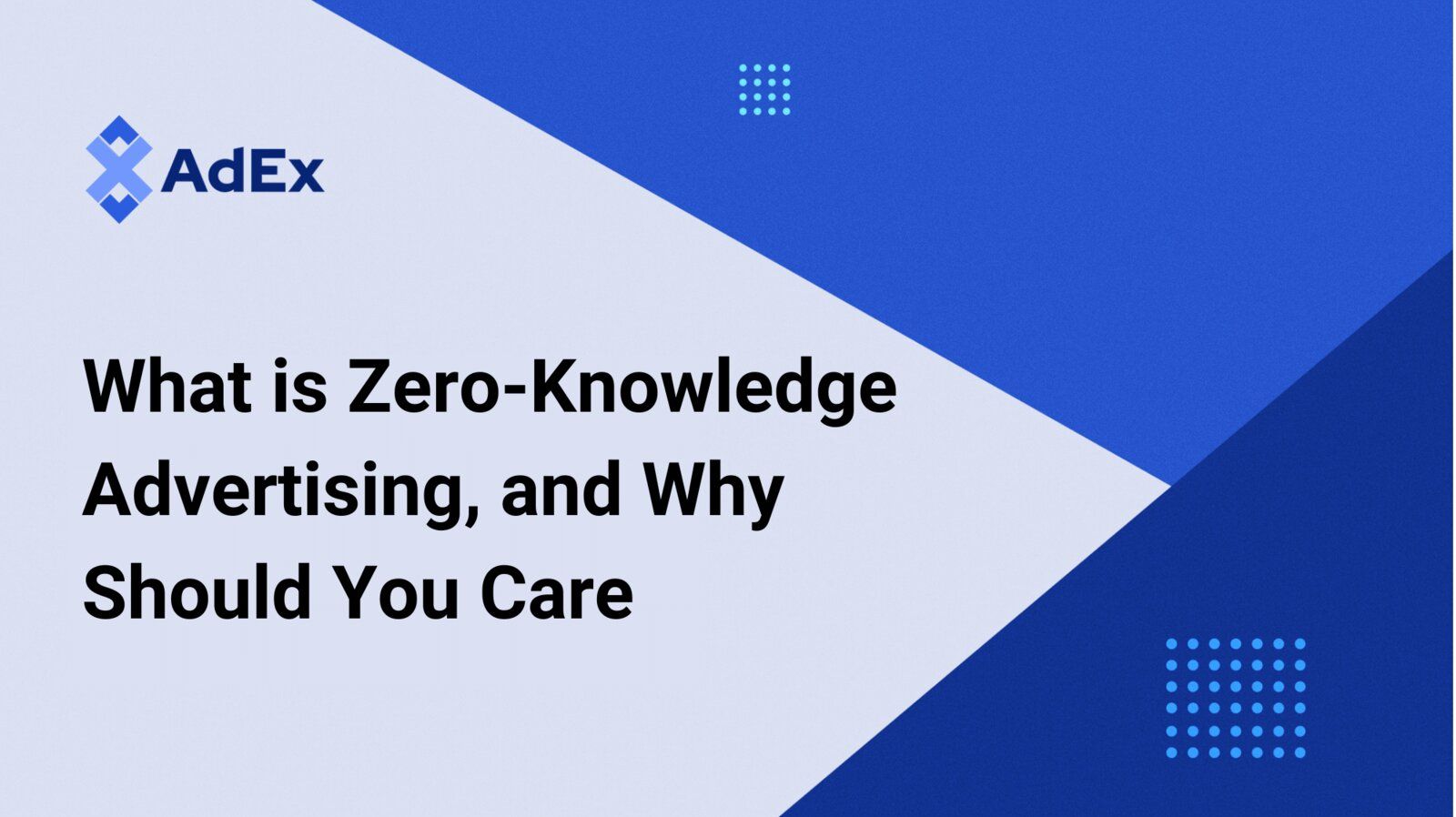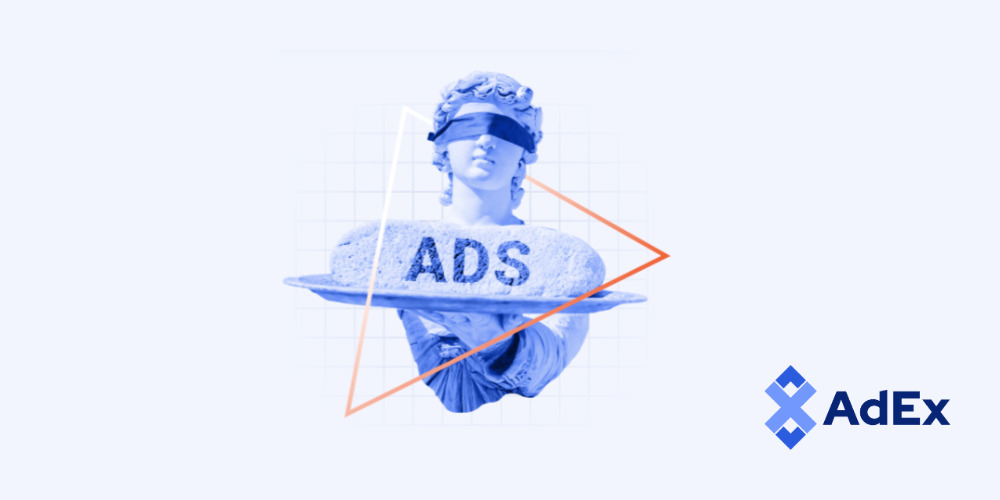What is Zero-Knowledge Advertising, and Why Should You Care
Our latest article delves into Zero-Knowledge advertising, why it is important for you, and how AdEx ZK is pioneering it.

In an era where digital footprints are as real as physical ones, the digital advertising status quo is shifting. Users demand more control over their data, and regulators respond with stringent data protection laws. Amidst this, Zero Knowledge advertising emerges as the right combination between effective advertising and privacy preservation. But what is it, and why should it matter to you? Let's delve deeper.
The changing Ad-tech landscape
The ad-tech sector has been on a rollercoaster ride of evolution, driven by groundbreaking innovations and shifts in user preferences and regulatory standards. The journey from banner ads to the sophisticated programmatic advertising of today has been marked by the industry's insatiable hunger for data, driving precision targeting and personalization.
However, this evolution hasn't been without its share of controversies, primarily concerning user privacy. The sector's heavy reliance on cookies for user tracking and targeting has come under intense scrutiny, leading to a pivotal change: the phasing out third-party cookies. This move by industry leaders like Google reflects a broader shift towards a more privacy-conscious world, a change driven by regulatory actions like GDPR and CCPA, and a more privacy-savvy user base.
Parallel to these developments is the Web3 revolution, an emerging but potent force promising to redefine the internet's very fabric. Web3 brings the ethos of decentralization, user empowerment, and data privacy to the forefront, values increasingly resonating with a global audience. This paradigm shift presents both a challenge and an opportunity for the ad-tech sector, necessitating a rethink of traditional advertising strategies that often hinge on centralized data control.
Comparing cookieless ad-tech solutions
In the cookie-less future, the industry is at a crossroads. It's imperative to find methods that respect user privacy while still delivering efficient ads. This necessity has been the catalyst for several innovative solutions, each with its unique approach and technology, aiming to navigate this new landscape.
Contextual Advertising
- How it Works: Contextual advertising doesn't rely on individual user data. Instead, it places ads based on the content of a webpage, aligning with user interests implicitly.
- Pros: Enhances user privacy, reduces data breach risks, and is immune to the demise of cookies.
- Cons: Less personalized, potentially lower conversion rates.
- Example: Reading about dog training & getting an ad for dog treats
Federated Learning of Cohorts (FLoC) by Google
- How it Works: FLoC groups users with similar browsing behaviors, allowing advertisers to target cohorts instead of individuals.
- Pros: More privacy-compliant, no need for third-party cookies.
- Cons: Still under development, with potential privacy concerns, and it's facing industry resistance.
- Example: Instead of advertisers knowing you visited their website, they know someone with similar interests did.
Unified ID Solutions
- How it Works: These solutions use hashed email addresses as a common identifier to replace third-party cookies.
- Pros: Offers a level of user privacy, relies on first-party data, and provides cross-platform tracking.
- Cons: Depends on user opt-in and potential data security concerns.
- Example: The Trade Desk’s Unified ID 2.0.
Zero-Knowledge (ZK)
- How it Works: ZK enables information sharing between two parties without revealing the actual data, which is perfect for advertising.
- Pros: Superior user privacy, no data transfer required, fraud prevention.
- Cons: Depends on user opt-in, complex technology, and still in its infancy.
- Example: AdEx ZK leverages ZK technology for privacy-centric advertising.
Here’s a comparison table between the aforementioned ad-tech solutions:
| Solution | User Privacy | Personalization | Complexity | Dependency on Cookies |
|---|---|---|---|---|
| Contextual Advertising | High 🟢 | Low 🔴 | Low 🔴 | No 🚫 |
| FLoC | Medium 🟠 | Medium 🟠 | Medium 🟠 | No 🚫 |
| Unified ID | Medium 🟠 | High 🟢 | Medium 🟠 | No 🚫 |
| Zero-Knowledge advertising | High 🟢 | High 🟢 | High 🟢 | No 🚫 |
Each of these solutions reflects the industry's quest to reconcile effective advertising with the growing demand for privacy. However, the one-size-fits-all approach doesn't apply here, with each solution presenting its unique set of trade-offs. The choice depends on various factors, including the level of privacy compliance, the need for personalization, and the technical sophistication available to advertisers and publishers.
What is Zero-Knowledge Advertising?
Zero-Knowledge advertising stands at the forefront of a new digital advertising era, but what exactly does it entail? Fundamentally, Zero-Knowledge advertising hinges on zero-knowledge proofs. This cryptographic principle allows one party (the prover) to prove to another (the verifier) that a statement is true without conveying any information about the contents of the actual statement beyond the fact that the statement is true.
This innovative approach has several applications and advantages, particularly in the area of digital advertising:
Enhanced user privacy and ad relevance: Zero-knowledge advertising allows for the delivery of personalized ads based on user preferences or behavior without the need to access or know specific personal data. This not only ensures user privacy but also enhances ad relevance. Users receive ads tailored to their interests without directly tracking their activities, which can lead to a more positive perception of the ads they encounter.
Fraud prevention: The nature of zero-knowledge proofs in verifying transactions without revealing underlying sensitive information is a significant benefit for fraud prevention. Advertisers can be confident in the legitimacy of the clicks and impressions they pay for, enhancing overall campaign effectiveness.
Regulatory compliance and increased trust: Operating within the framework of zero-knowledge proofs means automatic compliance with stringent data privacy regulations. This compliance, coupled with the transparent nature of Zero-Knowledge advertising, fosters increased trust among users. When users know their data isn't being mishandled, they're more likely to engage positively with ads, enhancing the reputation of advertisers and platforms.
Performance benefits for advertisers: Beyond user privacy, Zero-Knowledge advertising offers tangible performance benefits for advertisers. By serving users with ads that align with their interests — assured by the nature of zero-knowledge proofs — user engagement is likely to be higher. This increased engagement translates into better campaign performance, higher click-through rates, and potentially improved conversion rates, all achieved without infringing on user privacy.
In essence, Zero-Knowledge advertising is a win-win for all parties involved. Users enjoy a privacy-centric browsing experience, advertisers benefit from improved campaign performance, and ad platforms can operate within regulatory guidelines. All of this contributes to a healthier, more sustainable digital advertising ecosystem.
AdEx ZK: A pioneer in Zero-Knowledge Advertising

Ever since its launch in 2018 as an ad network serving publishers and advertisers, AdEx has used zero-knowledge technology to run campaigns successfully. The entire process of targeting and serving ads occurs on the user's device, meaning their personal data never leaves their device. This approach guarantees complete user privacy and control over their data and is also fully compliant with data regulations while still allowing us to use behavioral targeting efficiently. Currently, AdEx continues to build on this and to pave the way forward for a cookie-less advertising world. The innovative platform fosters the Web3 privacy and user empowerment ethos, leveraging in-situ technology to deliver a next-generation ad platform.
At AdEx, we fully embrace the principles of ZK and abstain from collecting personal data. To achieve this, we do not need to use traditional ZK proofs because, in our perspective, conventional cryptography, such as elliptic curves or even no cryptography at all, suffices for 99% of use cases. Our approach revolves around architecting the system in a zero-knowledge manner, thus making us and our advertisers fully compliant with current and future privacy laws.
Moreover, AdEx ZK goes beyond just serving ads. Again, it gives advertisers valuable insights into their campaign performance without compromising user data. This aspect is crucial for advertisers who rely on analytics to strategize and optimize their ad campaigns.
The platform's commitment to transparency and user control is further evidenced by its consent framework. Users will have the final say on the kind of data they are willing to share by opting in for the ad categories they are interested in, something that we call "user-curated ads".
Challenges ZK advertising is facing
The emergence of Zero-Knowledge advertising indicates a significant shift in the digital advertising landscape, yet its journey toward widespread acceptance isn't without hurdles. One primary challenge lies in the industry's inertia. For years, digital advertising has thrived on extensive data collection, and a move towards data minimalism, as proposed by Zero-Knowledge advertising, might meet resistance. This resistance is not just due to comfort with familiar methods; companies whose models are vested in data may view this innovative approach as disruptive to the status quo.
Moreover, while Zero-Knowledge advertising benefits privacy advocates, its complexity can lead to consumer misconceptions. The concept, though revolutionary, is not the easiest to grasp for the average user. This lack of understanding, coupled with years of mistrust due to data mishandling, poses a challenge in gaining consumer confidence. However, it's noteworthy that a growing segment of the consumer base, informed about data privacy concerns, is welcoming this initiative. They regard Zero-Knowledge advertising as a positive leap forward, promising a balance between personalized advertising and data privacy.
Overcoming these challenges will require concerted efforts in educating both the market and consumers, demystifying the concept, and highlighting its benefits. Furthermore, collaboration across the industry is crucial to creating standardized practices and protocols, making Zero-Knowledge advertising accessible and functional across various platforms. The responsibility is on industry pioneers to demonstrate the approach's viability and lead the way in fostering its adoption.
Conclusion
Zero-Knowledge advertising is more than a novel concept; it's a necessary evolution in digital advertising. As the industry grapples with the dual challenges of preserving user privacy and delivering effective advertising, solutions like AdEx ZK offer a promising path forward.
The journey ahead for Zero-Knowledge advertising is not without its challenges, but the potential rewards — for users, advertisers, and platforms alike — are immense. It represents a future where advertising is not just tolerable but welcomed, users can enjoy free content without privacy concerns, and advertisers can forge meaningful, trust-based relationships with their audience.
In embracing Zero-Knowledge advertising, we're not just adapting to a new advertising method but endorsing a more sustainable, ethical, and user-friendly internet. It's a bold step forward, but it's a step we must take collectively, with users and industry stakeholders walking hand in hand toward a more privacy-conscious world.
Interested in AdEx? Follow us:
X (Twitter) | Telegram | Reddit | Facebook | LinkedIn
